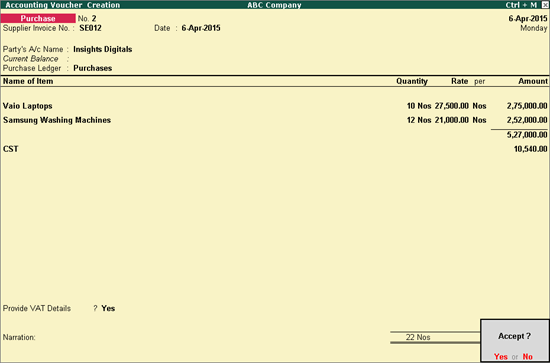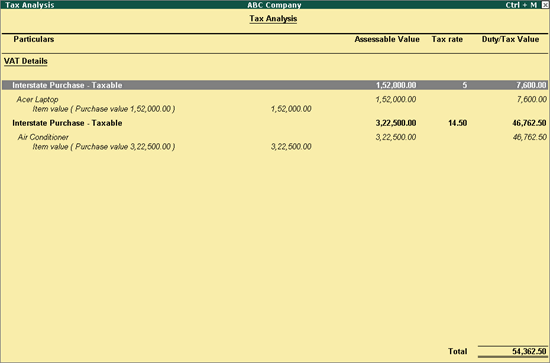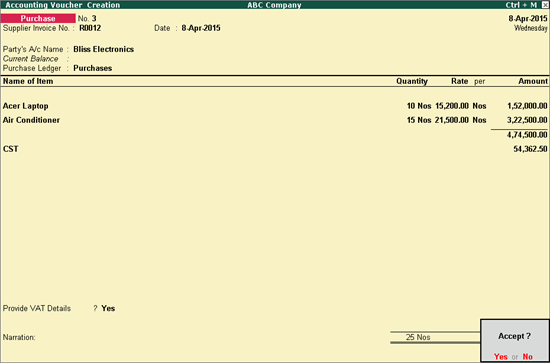
You can record interstate purchases against Form C and interstate purchases with multiple CST rates.
Interstate purchases have to be taxed at 0% CST rate against Form C when:
● It is a transit transaction against Form E2.
● The goods are taxed at 0% under section 8(5) of the CST Act, read with section 8(4) (against Form C).
To record such purchases, the following enhancements are introduced:
● Nature of transaction - Interstate Purchase Exempt - With Form C is provided for states enabled to support for Chhattisgarh, Himachal Pradesh, Jharkhand, Karnataka, Rajasthan, Uttarakhand and Uttar Pradesh.
Note: The option Is under CST exemption? is provided for states enabled to support VAT for Rajasthan, Uttar Pradesh and Karnataka. After selecting the Form to issue as Form C , you can set this option to:
♦ Yes , if the goods are taxed at 0% when purchased against Form C .
♦ No , if the transaction is against Form E1/E2 .
On this page
Interstate purchase Exempt with Form C
Interstate purchase against Form C
Interstate Purchase at Multiple CST Rates
1. Go to Gateway of Tally > Accounting Vouchers > F9: Purchase .
2. Enter Supplier Invoice No. and Date .
3. Select the party ledger in the field Party's A/c Name .
4. Set the option Is Against C Form? to Yes in the Party Details screen. This option appears only when the State selected is other than the State selected in the Company VAT Details screen.
5. Select the purchase ledger predefined with the nature of transaction Interstate Purchase Exempt - With Form C .
6. Select the required stock items.
7. Set the option Provide VAT Details? to Yes . In the Statutory Details screen,
o Enter the Supplier inv. no. and Date .
o Select C Form as the Form to issue .
o Set the option Is Under CST exemption? to Yes / No , as required. This option appears based on the state selected for VAT compliance.
o Press Enter to save and return to purchase invoice.
8. Press Enter to save.
1. Go to Gateway of Tally > Accounting Vouchers > F9: Purchase .
2. Enter Supplier Invoice No. and Date .
3. Select the party ledger in the field Party's A/c Name .
4. Set the option Is Against C Form? to Yes in the Party Details screen. This option appears only when the State selected is other than the State selected in the Company VAT Details screen.
5. Select a common purchase ledger in which the option Is VAT/CST Applicable? is set to Applicable , and the option Set/Alter VAT Details? is not enabled.
6. Select the required stock items.
Note: If the option Is Against C Form? is set to Yes in the Party Details screen, the tax gets calculated at 2% CST rate. This is irrespective of the tax rates defined in the inventory or accounting masters.
7. Select the CST ledger grouped under Purchase Accounts or Direct Expenses with the option Type of duty/tax set to CST .
8. Set the option Provide VAT Details? to Yes .
o Select C Form in the field Form to issue .
o Enter the C Form details.
o Press Enter to save, and return to purchase invoice.
The purchase invoice appears as shown below:

9. Press Enter to save.
1. Go to Gateway of Tally > Accounting Vouchers > F9: Purchases .
2. Enter Supplier Invoice No. and Date .
3. Select the party ledger in the field Party's A/c Name .
4. Set the option Is Against C Form? to No in the Party Details screen. This option appears only when the State selected is other than the State selected in the Company Creation screen.
5. Select a common purchase ledger in which the option Is VAT/CST Applicable? is set to Applicable , and the option Set/Alter VAT Details? is not enabled.
6. Select the required stock items whose VAT rates are specified either at the stock group or at the stock item level. Enter Quantity and Rate for each stock item.
7. Select the CST ledger grouped under Purchase Accounts or Direct Expenses with the option Type of duty/tax set to CST .
8. Click A : Tax Analysis to view the Tax Analysis screen.
9. Click F1 : Detailed to view in detailed mode. The Tax Analysis screen appears as shown below:

10. Press Esc to return to the purchase invoice. The purchase invoice appears as shown below:

11. Press Enter to save.